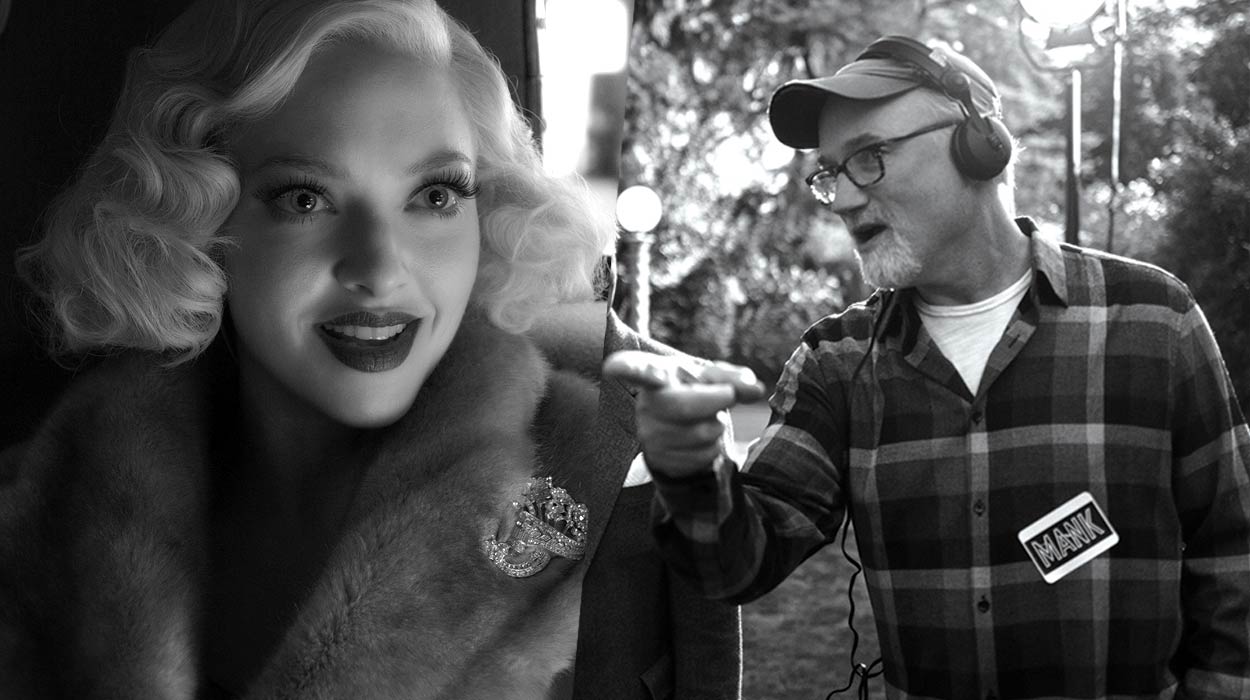There’s a lot going on in “Mank.” Superficially, it’s about the making of “Citizen Kane,” but not really, it’s about artistic legacy, Old Hollywood, perhaps the way some people self-destruct, there’s a political fake news thread throughout it; I’m curious how he pitched the movie to you and what he thought it was about.
God, I don’t know. The biggest takeaway I got from that conversation was that it was so important to him for “Mank” to feel like it was made back in the thirties and forties and to have every single element match, the viewing experience matches the viewing experience of old movies. But it still had to maintain this grounded-ness and believability, and everything had to be as authentic as possible. It had to feel real. It had to feel like you could be there. And I don’t feel like I get movies like that.
But with this movie, he elevates everything that was happening back in the thirties and forties and how they made movies back then to make audiences really transported to that time. And the way he was selling it, it just felt like it was going to be real and a real test and a new opportunity to have all technology of today, and mixing it with the beauty of what they were doing back then. It’s one of a kind.
Fincher has the “multiple takes” or “too many takes” stigma attached to him, and he loathes that. And there were some reports you guys did 200 takes of one scene or something ridiculous like that. But it strikes me that having time and space to perfect something may not be that bad, especially for actors that have worked in an indie world where you aren’t afforded that many takes and have to move on.
Yes! It’s not a negative thing at all. It just isn’t. And sure, when I thought of David Fincher back in the day, I just thought of lots of takes, really hard. That’s what came to mind, even subconsciously. But yes, you’re right, there’s a negative connotation too, The meaning behind that feels like it might be hell for actors, and I imagine— clearly, it has been hell for certain actors. But actors I worked with on this movie and the actors I’ve talked to who have worked with David, have absolutely no issue with it. It’s not the easiest thing in the world, sure. But it’s not meant to be easy, and if you love theatre, you probably love working with David Fincher because you get every single opportunity possible to nail that moment in that scene and to help this story get told in the way he needs it to be told.
And the way he needs it to be told is usually the way it should be told. Do you know what I mean? I want to see his movies. I want to be in his world all the time. He can do no wrong to me, and I was a fan obviously before this. So, why not? Why not give it all you can? And if you have the time to do it, you take it, and it makes you feel better afterwards. You feel transformed working with him when you’re done the day. You go through like a rollercoaster of emotions while you’re doing it.
Every day is like a big curve. You start; we’re all thinking, “this is going really well.” And then you’re like, “I’ve done all the things I can think of do doing. And then you’re like, Oh God, what am I doing? I’m horrible. Oh, my God. He just wants to do it again. And again, Oh God, what am I going to?”
And then you have breakthroughs. “Oh, I’m getting it. Yes. These things and this, Oh my God, God.” And then all of a sudden you hit the apex again. And you’re like, we did it!” It’s a weird way of describing it, but it makes sense.
Do you have a favorite scene?
Oh, man, I love them all. I guess the scene that shows Marion the most— if you had to pick only one— the one that reveals who she really is. I think it’s the scene in the forties, when she comes to visit Mank’s house. She sits with him and says, “I don’t care. This is not important to me. It’s important that you don’t kick him to curb because he’s, he’s everything to me.” [editor’s note: Marion’s gently trying to dissuade Herman Markiewicz from changing “Citizen Kane” so it doesn’t hurt her lambasting her paramour William Randolph Hearst, but also so Mank doesn’t torch his own career by doing so]. That was a beautiful scene between the two of them because you really felt like the camaraderie between them had not died since the ugly event years earlier [Ed: A drunken Markiewicz embarrasses himself at Heart’s estate at a dinner party in front of several important guests and it’s the beginning of the end for his stature in Hollywood]. They’re still the same people. And you really start to understand why Mank and Marion were so drawn to each other in the first place. It’s beautiful, it was perfectly written, and we executed it really well. Gary and I had a great time working together and that was our last scene together.
“Mank” is available now on Netflix.





